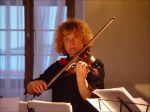Dorothea Kellerová
I was born in the family of a protestant priest and the church was my first music room. I was fascinated by the organ. Watching my father, I was enchanted by the fact that he needed both his hands and feet to play and even somebody else who turned the pages for him, and the result of all that was superb music lingering within the space long after the organ had been closed. Later I was allowed to make my own try. But even at times when I was unable to read notes, I tried to reproduce on the piano all sorts of things that I heard before. And later also things that nobody ever heard. For example I often played my curriculum vitae. Fortunately nobody was able to understand it.
 I certainly did not want to play the violin. It looked awfully funny in my eyes. But they made me play it. The piano, though, remained my source of music and imagination. I started to go to a school of music in Kutná Hora, and namely to learn both instruments. However, when asked what I was playing I said: the violin. After all, this seemed to be my official instrument; hobbies do not count. I learned the notes and wrote the first small compositions.
I certainly did not want to play the violin. It looked awfully funny in my eyes. But they made me play it. The piano, though, remained my source of music and imagination. I started to go to a school of music in Kutná Hora, and namely to learn both instruments. However, when asked what I was playing I said: the violin. After all, this seemed to be my official instrument; hobbies do not count. I learned the notes and wrote the first small compositions.
At the age of 11 I sent my application to a newly founded Experimental School of Music and Dance. I set out to Brno – for me a real City – with trams, trolley-busses, theatres. That was a four years' preparation for the conservatory. The set of our class was extravagant: one girl violinist, one boy cellist, eighteen dancing girls and two dancers.
Strong musical impressions were not too much due to the violin, but rather to "expanded musical education" wherein Zdeněk Kaňák, Professor of the Brno Conservatory, initiated the two musicians of ours into the overwhelming diversification of the musical world. It is a natural need of each musician not only to get trained to play some instrument, but of course to express one's emotions in a creative way – by writing canons, variations, and, if there is an appealing text, then to add an appropriate musical expression. And there was also the subject called instrumentation at the Conservatory, as well as the urge to play all that. Playfulness, spontaneity, variations to the compositions of the Great and their stories, real and fictitious, all that exerted an immense attraction.
Later, when we were already studying at the Conservatory, Mr. Kaňák would visit our concerts and during the production of his former students he was usually able to put down a nice celebrating poem which he handed over to us together with his congratulations.
At the Brno Conservatory I started studying the violin in the class of Prof. Bruno Hyčka, later of Prof. Rudolf Šťastný, who devoted to his pupils by far more time and energy than was his duty. His personal approach to every and each of us was binding. My second specialisation was composition (Prof. Vladimír Werner), but in the fourth class I decided to restrict my attention to the violin only. The cosmic world of interpretation art engulfed me completely, but each musician should maintain his/her sheer joy by making private music or by creating one's own pieces. At those times I was writing small chamber items revealing a clear influence of Alfred Schnittke and Arvö Pärt.
After having finished the Conservatory I anchored in the fascinating world of symphonic music. I became member of the State Philharmonics of Brno and at the same time I commenced my extramural studies at the Prague Academy of Music. My teachers were Associate Professor Jiří Novák and later especially Associate Professor Josef Vlach who was my violin idol, and I took a real pride in being his student.
After having graduated from the Academy, I founded a family with my husband and a few years later the Quakvartet. In 1995 Iva Bittová invited me to co-operate with her in the 44 duets from Béla Barók that we gave in concert tours at home and abroad. Related to this collaboration also a CD was recorded (editor Rachot-Behémót 1996). Without any exaggeration, in playing and singing with Iva one of my dreams came true, real dreams, as I had never thought that I would do music with her.
At the present day Quakvartet can get only the time that is left when I meet my obligations with the Philharmonics. However, this is my most pleasurable work. Each further composition of mine or by any other member of the band, playing compositions by other authors or pure improvisation, all that helps us to discover superb things in the space between ourselves and beyond ourselves, and it is only too natural that we feel an urge to offer these wonderful things also to other people
